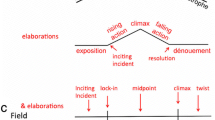Abstract
While the writings of Erving Goffman have illuminated the dramaturgical components of face-to-face interaction, the task of developing a thoroughgoing substantive and theoretical explication of the dramaturgical society remains. This paper explores the utility of a dramaturgical analysis at the macrosocietal level. The character of a dramaturgical society is discussed in the first section. The origins of a critical dramaturgy are presented in the next section. The conditions of social organization which give birth to a dramaturgical society are set forth in the next sections, and the utility of dramaturgy for a self-directed society are weighed in the final section.
Similar content being viewed by others
References
Boorstin, Daniel 1962 The Image. New York: Antheneum Press.
Buckley, Walter 1968 “Society as a complex adaptive system.” In Walter Buckely, Modern Systems Research for the Behavioral Scientist. Chicago: Aldine.
Burke, Kenneth 1954 A Grammar of Motives. New York: Prentice-Hall.
———— 1965 Permanence and Change. Indianapolis: Bobbs-Merrill.
Combes, James E. and Michael W. Mansfield, eds. 1976 Drama in Life. New York: Hastings House.
Duncan, Hugh D. 1962 Communication and Social Order. New York: Bedminister.
----1965 “Introduction” to Burke, 1965.
Edelman, Murray 1964 The Symbolic Uses of Politics. Urbana: University of Illinois.
Goffman, Erving 1959 Presentation of Self in Everyday Life. Garden City, New York: Doubleday.
———— 1961 Encounters. Indianapolis: Bobbs-Merrill.
———— 1963 Behavior in Public Places. New York: Free Press.
———— 1967 Interaction Ritual. Garden City, New York: Doubleday.
Gouldner, Alvin 1970 The Coming Crisis in Western Sociology. New York: Basic Books.
Gusfield, Joseph 1963 Symbolic Crusade. Urbana: University of Illinois.
Habermas, Jurgen 1970a Toward a Rational Society. Boston: Beacon Press.
———— 1970b “Toward a theory of communicative competence.” In Hans Peter Dreitzel, ed., Recent Sociology, No. 2. Toronto: MacMillan.
———— 1974 “On social interest.” Telos 19 (Spring):91–103.
Helmer, John 1970 “The face of the man without qualities.” Social Research 37 (Winter):547–579.
Ichheiser, Gustav 1970 Appearances and Reality. San Francisco: Jossey-Bass.
Israel, Joachim 1971 Alienation: From Marx to Modern Sociology. Boston: Allyn and Bacon.
Klapp, Orrin 1976 “Dramatic encounters.” In Combes and Mansfield, eds., Drama in Life. New York: Hastings House.
MacKay, Donald M. 1968 “Towards an information-flow model of human behavior.” In Walter Buckely, ed., Modern Systems Research for the Behavioral Scientist. Chicago: Aldine.
Mannheim, Karl 1936 Ideology and Utopia. New York: Harcourt, Brace and World.
Marcuse, Herbert 1964 One-Dimensional Man. Boston: Beacon Press.
Merelman, Richard M. 1969 “The dramaturgy of politics.” Sociological Quarterly 10, 2:216–241.
Mueller, Claus 1973 Politics of Communication. New York: Oxford University.
Nimmo, Dan 1976 “The drama, illusion and reality of political images.” In Combes and Mansfield, eds., Drama in Life. New York: Hastings House.
Perinbanayagam, R. S. 1975 “The reality of drama.” Paper presented at the Annual Meeting of Midwest Sociological Society, Chicago.
Rader, Victoria 1976 “Stratification theory and participation theory.” Paper presented at the Annual Meetings of the American Sociological Association, San Francisco.
Thompson, Victor 1966 Modern Organization. New York: Knopf.
Weber, Max 1946 From Max Weber: Essays in Sociology. Hans Gerth and C. Wright Mills, eds. New York: Oxford University.
Young, T. R. 1972 New Sources of Self. New York: Pergamon Press.
----1975 “Critical dimensions in dramaturgical analysis: Backstage at the Whitehouse.” Presented at the 1976 American Sociological Association meetings in New York. Draft available from the Red Feather Institute.
----1977 “Radical dimensions in modern systems theory; a general theory of social order and a special theory of social change.” In Western Sociological Review, forthcoming.
----1978 “Critical dimensions in dramaturgical analysis: The division of labor in the construction of social reality.” Draft paper available through Red Feather Institute.
Young, T. R. and John R. Brouillette 1976 “Bureaucracy and modern society.” Paper presented at the Annual Meeting of the Southern Sociological Society, Miami.
Author information
Authors and Affiliations
Additional information
This paper was prepared with the assistance of Jeanne Boland, New Zealand.
Rights and permissions
About this article
Cite this article
Young, T.R., Massey, G. The dramaturgical society: A macro-analytic approach to dramaturgical analysis. Qual Sociol 1, 78–98 (1978). https://doi.org/10.1007/BF02390165
Issue Date:
DOI: https://doi.org/10.1007/BF02390165




